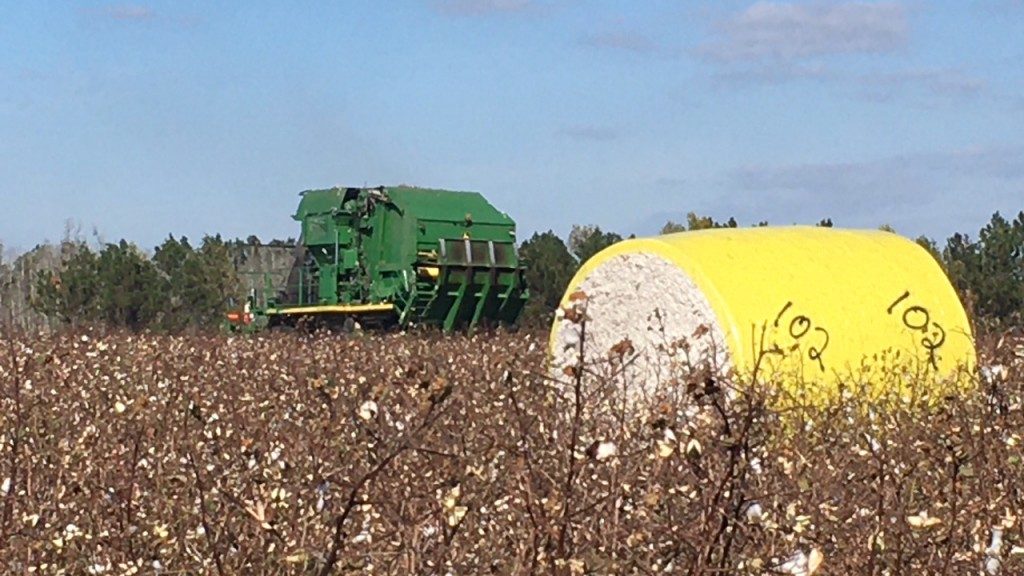Recent Posts
-
Below is a brief update on fall vegetable diseases from Dr. Bhabesh Dutta (Extension Vegetable Pathologist, UGA, Tifton) Cucumber downy mildew has been reported from few counties in GA in Fall watermelon and cucumbers. This disease can cause severe defoliation and vine decline resulting in significant yield loss. As a preventative spray, growers can tank mix…
Posted in: Uncategorized -
At the cotton defoliation meeting that was held last week at the Colquitt County Extension office, Jared Whitaker brought up some good points to consider for this upcoming cotton harvest season. Defoliation Timing: Cotton defoliation is a sensitive process. For a successful harvest, defoliation must be carefully timed and carried out. Poor defoliation can lower…
Posted in: Cotton -
When growers bring in peanut samples to County Extension maturity clinics, often they ask about when to terminate fungicide applications. Well, it all depends on their particular disease situation they are facing. Bob Kemerait, UGA Peanut Plant Pathologist, has given some great suggestions to answer these questions.. Below are some typical situations that peanut…
Posted in: Peanuts -
Up Coming Meetings: Georgia Cattlemen’s Regional Roundup Tuesday, August 23, 2016 This event will be held at the Colquitt County Extension Office and starts at 6 PM. If you are interesting in attending please RSVP to the Georgia Cattlemen’s office in Macon, 478-474-6560. Colquitt County Cotton Defoliation and Peanut Maturity Update Monday, August…
Posted in: Uncategorized -
Below is a brief update on Stored Grain Protectants from Dr. Michael D. Toews, UGA Entomologist. Update on Stored Grain Protectants: I am getting many calls about treating shelled corn as it goes into storage. Here is a primer on products and efficacy from my recent tests in Georgia. Actellic 5E (labeled for corn). This…
Posted in: Uncategorized -
Cabbage and leafy green production is huge for Colquitt County. This county is the biggest producer in Georgia for cabbage and various other brassica crops. However, it has not been easy for the growers in this county to produce these crops. Growers have been in a continuous battle with the diamondback moth (DBM), Plutella xylostella, which is…
Posted in: Vegetables -
Around Colquitt County, I have noticed that farmers are already preparing land for fall vegetable crops so I thought it would be a good to write about the fertility requirements for cabbage. The best fertility management programs are based off of soil tests taken from the field areas where the cabbage is to be planted. Trying to recommend…
Posted in: Uncategorized -
With hot temperatures, growers may be more likely to note stress-symptoms resulting from damaged root and vascular symptoms caused by plant-parasitic nematodes and/or Fusarium wilt. While there is nothing to be done now, growers should note where nematodes and Fusarium wilt are causing damage in a field and let us help them make decisions for…
Posted in: Uncategorized -
The sugarcane aphid is spreading quickly and building up to damaging levels in southern Georgia. Below is an update document, from Dr. David Buntin with recommendations for this pest for 2016. Author: David Buntin, Grain Crop Entomologist, UGA-Griffin Campus (gbuntin@uga.edu) In late August 2014 a new aphid was found attacking grain sorghum in Georgia. …
Posted in: Uncategorized -
Very low levels of Southern rust were found early this week (6-27-16) in a corn variety trial in Colquitt County. The corn was in early dent stage of development so yield should not be impacted. Below is picture of southern rust. Presently the majority of the corn in the county is late dough to…
Posted in: Uncategorized
